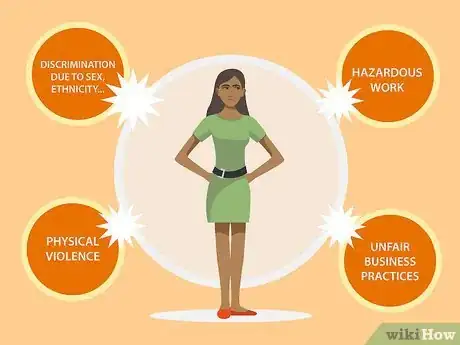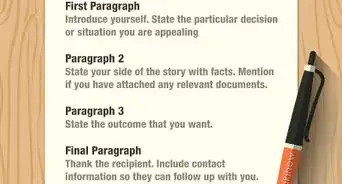This article was co-authored by Lyle Solomon, JD. Lyle Solomon is an Attorney and the Owner of the Law Office of Lyle D. Solomon. With nearly three decades of experience, he practices civil law and specializes in consumer debt relief services and bankruptcy. Lyle is also the author of Think Different! Save More! He holds a BA in Criminal Justice from The University of Nevada, Las Vegas, and a JD from The University of Pacific, McGeorge School of Law.
This article has been viewed 23,278 times.
There isn't a linear formula for getting unemployment. It varies from state to state. In California, for instance, you can't collect unemployment if you've left the job. In California, you have to be fired, or laid off; the employer has to stop employing you. However, if you are thinking of quitting because you're being bullied, there are some steps and tips that might help you.
Steps
Being Proactive
-
1Protect yourself. Understand that your safety comes before your job. Although you may feel hesitant about reporting the bullying, you should not wait to report a person or event that places your safety at risk. There are several options that are available to you:
- For physical violence, call the emergency services or the police.
- If the bully is putting you in a hazardous work setting, contact OSHA (Occupational Safety and Health Administration).
- If you are being discriminated against because of your ethnicity, religion, sexual orientation, ability, etc. you may contact the Department of Labor.
- If you have a union, ask to speak with your representative. However, if they don't know how to help, move onto the union chain of command and your administrative chain of command.
-
2Make reports as necessary. Be sure to tackle the bullying problem before it causes you to lose your job. Along with your report, include a possible solution that ensures your safety.
- If you notice a pervasive or persistent pattern of abuse towards you, that occurs over time, tell someone who is the perpetrator's superior. There's usually a boss of a boss. Even if they're in on it, as a manager or administrator, they're responsible for ensuring a safe work environment. This is where your documented notes will help you.
- Take note of the higher authority's response, as well as what they agree to do in order to stop the bullying. For example, you could write, "On April 2, 2014, I told JT that Vanessa C. was laughing at my work during the meeting. He said that he will talk to her about it this week by Thursday, and that the behavior should stop afterwards."
Documenting Workplace Bullying
-
1Document the instances of bullying. In order to successfully defend yourself, it is best to gather evidence and record each event. Take note of the date, time, and place of the workplace harassment.[1]
- Be sure to include the event and important details, such as the name of the bully, the words, actions, etc.
- Take note of the specific behavior that occurred. Despite how small the event may seem, understand that it all adds up as evidence against your bully. For example, you could write, "March 24, 2015: Around 10 A.M., I heard Vanessa Cornell training other staff on the new procedures. However, she refused to train me. When I asked for help, she told me to "figure it out."
-
2Watch out for hostile behaviors. Hostile behavior could include physical or verbal abuse. Be sure to note the events, as well as the names of any witnesses that could testify for you. Defend yourself from the attack as necessary, but do so without building up evidence against yourself or giving the bully a reason to further persecute you. Be sure to immediately inform higher authorities of any instances where the bully was especially threatening (such as hitting you).
-
3Take note of physical symptoms of stress. These include feeling on edge, increased irritability, inability to concentrate, inability to sleep, nausea, and vomiting. These could occur prior to having to be in the work setting where the bully works. Exhaustion, feeling tired or having low energy, depression, feelings or thoughts about wanting to harm yourself or the bully could also occur. If any of these symptoms exist, get medical attention immediately.
- You may need to request that your employer send you for a worker's compensation evaluation. All you need to tell him or her is, "I've been injured at work." On the forms, you can summarize the contents of your notes.
- For example, you could say "I've been harassed by Vanessa C for 20 workdays. I notified my supervisor on April 2, 2014, but the behavior did not stop. I notified the supervisors again; however, I was still being verbally abused, embarrassed in front of coworkers, unfairly blamed for things I had no responsibility for, and physically threatened. As a result of all this, I am suffering symptoms of stress and anxiety. My physician believes that it's work related."
- You may need to request that your employer send you for a worker's compensation evaluation. All you need to tell him or her is, "I've been injured at work." On the forms, you can summarize the contents of your notes.
Taking Further Action
-
1Document the outcomes of your actions. Once you take action to make the bullying stop, take note of the results. These are major contributions to your physical evidence of the bullying. These contributions will show that you attempted to take action in defending yourself rather than allowing it to occur.
-
2Obtain copies of your medical or mental health assessments. Keep these records to add to your physical evidence. Depending on your diagnosis and prognosis, you may be eligible for your state disability or worker's compensation insurance.
- The copies of your notes, your assessment, and any copies proving the reason of your quitting can also help you make your case as to why you qualify for unemployment for quitting. They can also explain why you were unfairly terminated or laid off. The burden of proof is on you; you will need to give as much evidence as you can in order to justify why you'd qualify.
- Therefore, keep your own records. No one will defend you as strongly as you will for yourself. Other items of proof are pictures and witness statements of what others saw happen to you.
- The copies of your notes, your assessment, and any copies proving the reason of your quitting can also help you make your case as to why you qualify for unemployment for quitting. They can also explain why you were unfairly terminated or laid off. The burden of proof is on you; you will need to give as much evidence as you can in order to justify why you'd qualify.
Expert Q&A
-
QuestionCan you quit for hostile work environment?
 Lyle Solomon, JDLyle Solomon is an Attorney and the Owner of the Law Office of Lyle D. Solomon. With nearly three decades of experience, he practices civil law and specializes in consumer debt relief services and bankruptcy. Lyle is also the author of Think Different! Save More! He holds a BA in Criminal Justice from The University of Nevada, Las Vegas, and a JD from The University of Pacific, McGeorge School of Law.
Lyle Solomon, JDLyle Solomon is an Attorney and the Owner of the Law Office of Lyle D. Solomon. With nearly three decades of experience, he practices civil law and specializes in consumer debt relief services and bankruptcy. Lyle is also the author of Think Different! Save More! He holds a BA in Criminal Justice from The University of Nevada, Las Vegas, and a JD from The University of Pacific, McGeorge School of Law.
Attorney Yes, you can. If you are able to document and prove the hostile environment, this may be considered a constructive termination, instead of a voluntary quit. This way, you might be eligible for unemployment benefits. Keep in mind, though, that these situations are usually evaluated in a case-by-case basis.
Yes, you can. If you are able to document and prove the hostile environment, this may be considered a constructive termination, instead of a voluntary quit. This way, you might be eligible for unemployment benefits. Keep in mind, though, that these situations are usually evaluated in a case-by-case basis. -
QuestionHow do you prove a hostile work environment?
 Lyle Solomon, JDLyle Solomon is an Attorney and the Owner of the Law Office of Lyle D. Solomon. With nearly three decades of experience, he practices civil law and specializes in consumer debt relief services and bankruptcy. Lyle is also the author of Think Different! Save More! He holds a BA in Criminal Justice from The University of Nevada, Las Vegas, and a JD from The University of Pacific, McGeorge School of Law.
Lyle Solomon, JDLyle Solomon is an Attorney and the Owner of the Law Office of Lyle D. Solomon. With nearly three decades of experience, he practices civil law and specializes in consumer debt relief services and bankruptcy. Lyle is also the author of Think Different! Save More! He holds a BA in Criminal Justice from The University of Nevada, Las Vegas, and a JD from The University of Pacific, McGeorge School of Law.
Attorney You need to show the unemployment department of your state that you left your position due to a hostile environment in which you felt you had no alternative but to get out of. Do your best to gather documents and evidences of the circumstances endured to help your case.
You need to show the unemployment department of your state that you left your position due to a hostile environment in which you felt you had no alternative but to get out of. Do your best to gather documents and evidences of the circumstances endured to help your case.
Warnings
- Make sure you have a pattern of showing that you've tried to resolve the issue and that no one has helped you with it (if in fact they haven't). Don't lie, and don't resort to violence.⧼thumbs_response⧽
- Weigh out the pros and cons of what you plan to do to stop the bullying against yourself; weigh the pros and cons before you implement your plan. Do not expect anyone else to try and defend you; you must defend yourself. Do not expect anyone to do your research on how to apply for benefits for you. The resources are online; read and apply.⧼thumbs_response⧽
- Do not put yourself in unsafe situations because you think it will yield monetary gain, because nobody can tell the future 100%. Respect yourself and protect yourself, in order to prevent the situation from getting worse.⧼thumbs_response⧽
- Avoid badgering or bullying people who refuse to help you or didn't witness the bullying. In your eagerness to prove your point, you could get caught up acting like the abuser. Be careful, respect others, and know your boundaries. Move on to the next person who will help you.⧼thumbs_response⧽
- Don't bully the bully in return. This could only worsen the situation.⧼thumbs_response⧽
References
- ↑ Lyle Solomon, JD. Attorney. Expert Interview. 18 August 2021.






























































